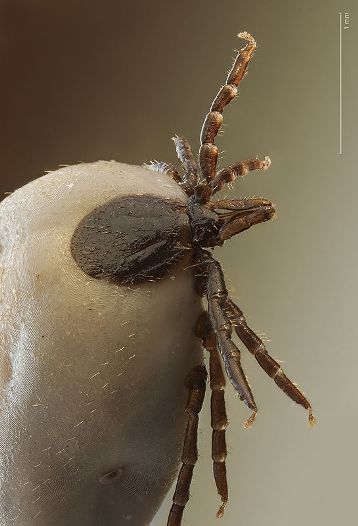Category:Hard Ticks - UK
The important tick species in the UK are all hard ticks as the environment does not suit the survival of soft ticks. They are distinguishable by differences in the morphology of the various important genera.
Ixodes spp.
Haemaphysalis spp.
Haemaphysalis spp. can be identified by:
- Wide palps
- Rectangular base of capitulum
- Eyes present on idiosoma
- Not ornate
- Festoons on posterior margin
- Posterior anal groove
The major species found in the UK, though rarely, is H.punctata, the red sheep tick. This is a three host tick that can complete its life cycle in a single year but in Wales takes between 2 - 3 years due to envirnmental conditions. H.punctata bites cause paralysis in sheep and cattle which the adults target as the third host, though they may also attach other medium to large mammals and humans. The larval and nymphal stages target small mammals, birds and lizards. As with many other ticks H.punctata transmits a number of diseases including tick born encephalitis (TBE), Q fever, tularaemia, Rickettsia slovaca, Theileria mutans, T.ovis, T.recondite, Babesia major, B.motasi, Anaplasma mesaeterum, Crimean Congo Haemorrhagic Fever, Borrelia burgdorferi (spanish lyme disease).
Dermacentor spp.
Rhipicephalus spp.
Rhipicephalus spp. can be identified by;
- Wide palps
- Hexagonal base of capitulum
- Eyes present on idiosoma
- Not ornate
- Festoons on posterior margin
- Posterior anal groove
There are 2 Rhipicepphalus species found in Europe; R.sanguineus,the brown dog tick is found in houses and kennels in the uK as outdoor conditions are not suitable. It is a three host tick and can complete its life cycle in 4 - 5 months, though this may take longer in colder conditions. This tick transmits Lyme disease (Borrelia burgdorferi), Babesia canis, B.gibson, Erlichia canis, E.vogeli, Salmonella enteritidis, Hepatozoon canis, Rickettsia conorii, Q fever, Rickettsia rickettsii (Rocky mountain spotted fever) to dogs. R.bursa, which infects horses is found in southern europe.
Pages in category "Hard Ticks - UK"
The following 4 pages are in this category, out of 4 total.
